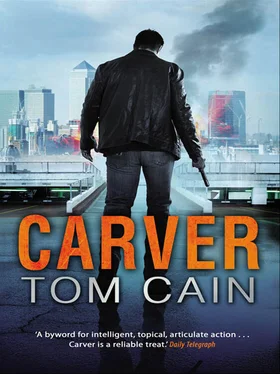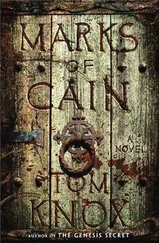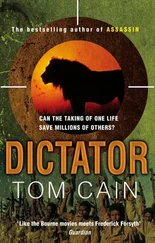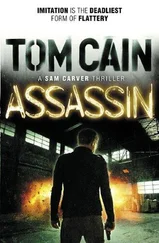Tom Cain - Carver
Здесь есть возможность читать онлайн «Tom Cain - Carver» весь текст электронной книги совершенно бесплатно (целиком полную версию без сокращений). В некоторых случаях можно слушать аудио, скачать через торрент в формате fb2 и присутствует краткое содержание. Жанр: Триллер, на английском языке. Описание произведения, (предисловие) а так же отзывы посетителей доступны на портале библиотеки ЛибКат.
- Название:Carver
- Автор:
- Жанр:
- Год:неизвестен
- ISBN:нет данных
- Рейтинг книги:4 / 5. Голосов: 1
-
Избранное:Добавить в избранное
- Отзывы:
-
Ваша оценка:
- 80
- 1
- 2
- 3
- 4
- 5
Carver: краткое содержание, описание и аннотация
Предлагаем к чтению аннотацию, описание, краткое содержание или предисловие (зависит от того, что написал сам автор книги «Carver»). Если вы не нашли необходимую информацию о книге — напишите в комментариях, мы постараемся отыскать её.
Carver — читать онлайн бесплатно полную книгу (весь текст) целиком
Ниже представлен текст книги, разбитый по страницам. Система сохранения места последней прочитанной страницы, позволяет с удобством читать онлайн бесплатно книгу «Carver», без необходимости каждый раз заново искать на чём Вы остановились. Поставьте закладку, и сможете в любой момент перейти на страницу, на которой закончили чтение.
Интервал:
Закладка:
Shortly after dawn, the observation post came under small-arms fire from an insurgent position behind an outcrop of boulders atop a ridge about three hundred metres away. This was no big deal. The insurgents always preferred to move at night and attack with the first light of day. Morales ordered his men to return suppressing fire. They didn’t have to take anyone out just yet. They just had to keep them in one place long enough for the Punisher to do its thing.
‘ Say hello to my leetle frien,’ Morales joked as he pressed the control that charged up the XM-25 and made it ready for use. Like his men, he had focused all his attention on the hostile position on the ridge. He had no idea that a dozen insurgents had made their way up the ravine during the night; not until the first grenade exploded inside the observation post, killing two of his men and wounding a third. Another grenade took out a fourth soldier. Morales himself was not targeted by the blasts. He and his remaining three troops were left for the Afghan fighters, inheritors of a guerrilla warfare tradition that dated back to the days of Alexander the Great and beyond, who scrambled over the HESCOs like pirates boarding a ship, armed with rifles, pistols and razor-sharp knives.
Morales had no means of protecting himself. The XM-25 was a fantastic weapon so long as its grenades exploded far enough away not to harm the soldier who had launched them. But at this kind of hand-to-hand range it was pointless: just a high-tech way of committing suicide. So Chico Morales never even fired a single round before he died, his throat sliced open by a curved steel blade. But in his last few seconds two thoughts crossed his mind. The first was that the insurgents had attacked in a way he’d never seen before: like trained professional soldiers. The second was that he could have sworn he heard someone shouting orders to them. And those orders had been given in English.
One of the insurgents stood over Morales’s body, even as the last few spurts of blood from his carotid artery were soaking into the earth around his corpse. He reached down and prised the XM-25 from Morales’s fingers.
‘ Cheers, mate,’ the insurgent said. ‘I’ll be having that.’
34
Tuesday, 28 June
Carn Drum Farm
Bryn Gryffud and Dave Smethurst left at four in the morning, driving the camper van; Uschi Kremer had already left in a separate vehicle late the previous night.
The remaining members of the Forces of Gaia had all woken early to see Gryffud and Smethurst off. Some of them went straight back to bed, others were gripped by a combination of anticipation, tension, anxiety and downright fear as the seconds ticked by. They brewed coffee, paced around the farmhouse kitchen, or made futile attempts to get some rest. All but one, though, stayed within Carn Drum farmhouse.
The exception was one of the two remaining women, Deirdre Bull. The closer the time came to the moment when the group would finally engage in direct action against the forces destroying the environment, the more troubled she became. Neither she nor any of the other members of the group had been told what the precise target would be — this, they had been told, was for their own protection as well as operational security — but she knew they were engaged on an act of destruction. And it made little sense to Deirdre to fight one act of ecological vandalism with another. When she’d gone to Brynmor Gryffud to voice her concerns, he had assured her that the good they were going to do in the long run far, far outweighed any short-term cost.
‘Gaia understands,’ he had assured her, knowing that Deirdre had an essentially religious view of the environmentalist cause. But Deirdre was still not entirely convinced. She had needed to get away, to be by herself, so that she could feel a sense of communion with the earth goddess and come to terms with what was going on. So around forty minutes after the camper van had set off on its journey south, just as dawn was breaking, she put on her green wellies and her cagoule — decorated with vivid, two-tone pink spots against a white background. Then she slipped out of the back door of the commune and, following a path that ended just a few metres from the house, headed off alone into the hills.
After she had walked for a few hundred metres Deirdre turned around to look back at the farmhouse down below her on the floor of the valley. The sun had begun to rise over the hills to the east and it was steadily spreading across the valley, replacing the soft-grey darkness with dazzling bright colour. Deirdre frowned as she saw two large, black vehicles heading at high speed along the drive that led to the house. From where she was standing they looked like vans of some kind, but as they got closer to the farm she could see that they were in fact four-by-fours. As a matter of principle, Deirdre knew as little as she could about any form of motorized transport. But the sheer intensity of her disapproval of these large, cumbersome, gas-guzzling vehicles, which so profoundly offended her socialist as well as environmentalist instincts, meant that she had absorbed some information about various makes and models. These, she suspected, might be Range Rovers — the worst of the lot, to her way of thinking.
As she watched, puzzled, yet somehow mesmerized by what she was seeing, one of the cars drove past the main house into the farmyard behind it. The other pulled up right in front of the farmhouse itself. Men got out of the vehicles, all dressed in black, their faces invisible behind balaclavas. They fanned out, surrounding both the front and back doors like malevolent wraiths. Each of the men was carrying something, held out in front of him, though Deirdre could not see what it was. She had a horrifying suspicion, however; one that she could not name, but that was tightening her belly and constricting her throat until she could scarcely breathe.
A man walked out of the front door of the farmhouse. From the shock of blond hair Deirdre recognized Tobyn Jansen, her favourite of all the male members of the group. She adored him for his commitment to the cause, his apparently effortless ability to make her laugh, and — though this she found hardest to admit, even to herself — his strongly muscled, golden-haired forearms.
Jansen stood in the open air for a moment, facing the four men who were lined up in a half-circle around him. He seemed to be saying something, though she could not hear what. His gestures, though, conveyed their own meaning: at first conciliatory, then increasingly indignant, and then desperate as Jansen seemed to plead with the men, then threw his hands up in a desperate but futile gesture of self-protection.
Deirdre saw a series of bright flashes. Tobyn Jansen staggered back before falling to the ground, and it was almost at the instant that the back of his head hit the foot of the farmhouse front door that the sound of gunfire reached Deirdre Bull’s ears. And then she started screaming.
35
Ronnie Braddock was a former paratrooper. He’d done his time in Iraq as a soldier, then again as a private contractor, bodyguarding administrators and businessmen for an American corporation that was less a commercial business than a private army. Now he was running his own crew, and after that Afghan job it was good to be working on home ground for once, instead of some fly-ridden shit-hole filled with stinking ragheads. The assignment had turned out to be easier than expected, too.
Braddock’s lads had come to the farmhouse pumped up, expecting opposition. They’d been told the occupants were members of a terrorist group. That suggested they’d be violent, determined, even willing to die for their cause. In the event, though, the five that they encountered inside the house were almost disappointingly easy to dispose of. They were unarmed, and unable to defend themselves. Even the men failed to put up a fight.
Читать дальшеИнтервал:
Закладка:
Похожие книги на «Carver»
Представляем Вашему вниманию похожие книги на «Carver» списком для выбора. Мы отобрали схожую по названию и смыслу литературу в надежде предоставить читателям больше вариантов отыскать новые, интересные, ещё непрочитанные произведения.
Обсуждение, отзывы о книге «Carver» и просто собственные мнения читателей. Оставьте ваши комментарии, напишите, что Вы думаете о произведении, его смысле или главных героях. Укажите что конкретно понравилось, а что нет, и почему Вы так считаете.












